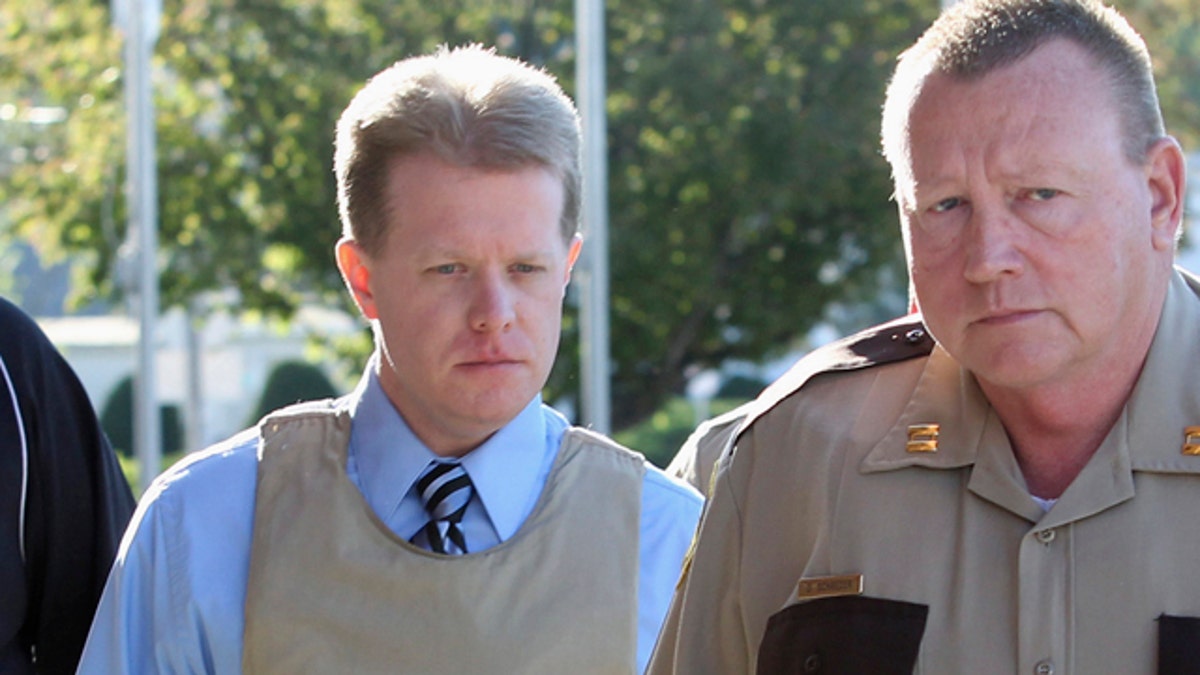
April 12: Murder suspect Christopher Coleman, left, accused of strangling his wife and their two sons, is escorted to the Perry County Courthouse during jury selection in his trial in Pinckneyville, Ill. (AP)
WATERLOO, Ill. -- A former Marine and pastor's son was convicted Thursday of strangling his wife and two sons exactly two years earlier in what prosecutors say was his bid to further an affair and keep a job with a televangelist.
Jurors deliberated 15 hours over two days before finding Christopher Coleman, 34, guilty of three counts of first-degree murder in the deaths of Sheri Coleman, 31, and their two sons, ages 11 and 9.
With the verdict, the trial advanced to the sentencing phase in which prosecutors said they would seek the death penalty, though such a sentence most likely would be symbolic because capital punishment was abolished in Illinois in March. Democratic Gov. Pat Quinn has pledged to commute a death sentence given to anyone before the ban takes effect July 1.
Prosecutors theorize Coleman killed his family on May 5, 2009, in the family's lakeside home in Columbia because he feared his affair with his wife's longtime friend would cost him his $100,000-a-year job as the security chief for Missouri-based Joyce Meyer Ministries. His case, with its mix of religion, adultery and violence, has tantalized much of the St. Louis region.
Upon hearing the verdict, Coleman bowed his head. He seldom looked up as jurors were polled on their decision.
Sheri Coleman's mother trembled when she heard the verdict, then sobbed and nodded at a relative sitting next to her.
As Christopher Coleman was being taken from the courthouse in a patrol car, dozens of on-lookers standing behind police tape cheered wildly and clapped. Some took snapped pictures with their cellphones.
Sheri Coleman's brother, Mario DeCicco, said the convictions brought "total relief" on an otherwise anguishing anniversary day.
"I could have been in Antarctica and it would have been a difficult day," he said. "Maybe that makes the day a little bit easier, that justice was served."
Christopher Coleman's family declined to comment.
Prosecutors argued Coleman spent months setting up the killings by sending himself threatening emails. Authorities said Coleman sprayed the crime scene with red paint to make it look like the killings were the work of a stalker critical of Meyer.
While acknowledging Coleman was adulterous, his attorneys argued there was no physical evidence directly linking him to the killings, and much of the testimony -- including that involving comparisons of Coleman's writing samples and the graffiti -- was unscientific and meaningless.
The defense also insisted investigators were too quick to focus on Coleman, excluding other potential suspects, in a harried bid to solve the closely watched case.
Coleman told police his family was asleep when he left the house to work out at a gym about five miles away on the morning of the killings, then grew concerned when he could not reach them by telephone. Their bodies were found after he called police.
Prosecutors presented a largely circumstantial case, eliciting testimony from witnesses who said the emailed threats were created on Coleman's laptop computer, and that there were similarities between Coleman's handwriting and writing patterns and the spray-painted graffiti at the crime scene.
Police also testified that the formula of the paint used by the killer was the same as that found in red paint Coleman bought weeks before the slayings.
Prosecutors leaned heavily on forensic pathologist Michael Baden's testimony that the victims perhaps were dead more than two hours before police say Coleman said he left for the gym. Baden said his assessment was based on reports and photos from the case and took into account such things as the rigidity and discoloration of the bodies.
A forensic pathologist who did the autopsies testified that while she did not feel she could accurately pinpoint when the victims died, she speculated the killings happened sometime between 3 and 5 a.m., still before Coleman's claimed departure for his workout.








































